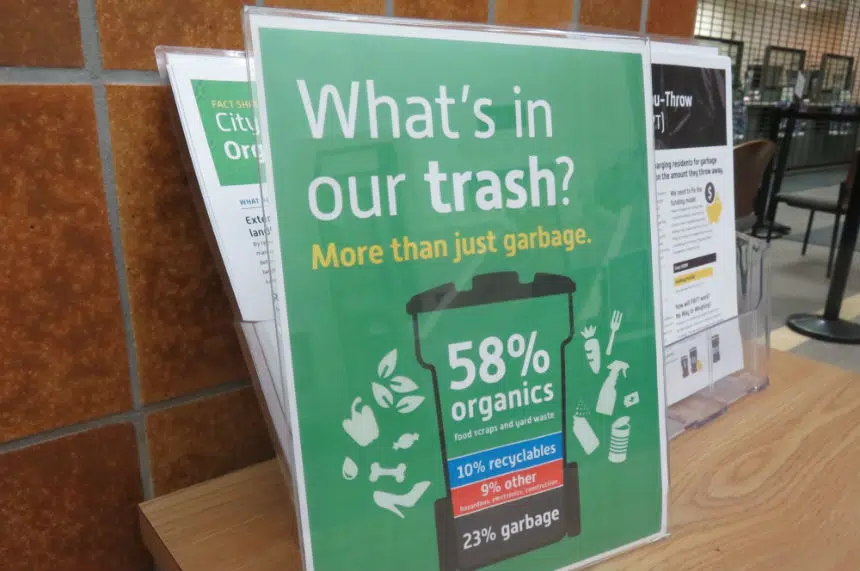Saskatoon city council is giving the organics can one last kick down the road to 2023, after voting to delay the implementation of a curbside green bin program.
Councillors debated when to roll out the new system for nearly two hours on Monday, with options ranging from a quick implementation in 2021 to a drawn-out system which wouldn’t see the full program in place until 2027.
Some felt the 2021 option would connect with too sudden of a tax jump for homeowners, while others saw a 2027 date as too far away in terms of environmental sustainability.
This is the option the environmental advisory committee member was recommending. Higher tax increases in short term, but faster implementation of the organics program. City estimates 57% of black bin waste could go in a green organics bin. #yxecc #yxe pic.twitter.com/kg1fhdMl4a
— Chris Vandenbreekel (@Vandecision) March 25, 2019
And now Coun. Iwanchuk moves for option three, which doesn't start the program until 2027 and gradually raises taxes. #yxecc #yxe pic.twitter.com/RzePaN7H2L
— Chris Vandenbreekel (@Vandecision) March 25, 2019
And now Coun. Jeffries is signalling intention to move option two, which is the 2023 start for the green bin we talked about earlier. Everyone keeping track okay? #yxecc #yxe pic.twitter.com/DXIClxCIuQ
— Chris Vandenbreekel (@Vandecision) March 25, 2019
After votes on both those options failed, along with a motion to defer the whole debate again until June, a compromise was reached for a four-year plan to begin the organic waste collection.
“We’re trying to look at the balance between making sure we bring the program forward in a reasonable period of time, and we also balance the finances as well,” Coun. Zach Jeffries told reporters afterwards.
The implementation will charge an extra one per cent to the property tax rate for each of the next three years, before a 0.93 per cent jump in 2023 when the curbside program finally rolls out.
However, that doesn’t mean the property tax will automatically increase by the same amount to fund the program. Councillors also voted in favour of exploring whether a windfall from the announced doubling of the federal gas tax could be used to offset some of the costs of the organics program.
The green bins were originally approved in October 2018, when the city was still considering a unified waste utility system. City staffers estimated 57 per cent of what currently fills a residential black bin could be diverted to the organics bin, drastically increasing Saskatoon’s waste diversion rates.
Now with the program delayed until 2023, the city is unlikely to reach its stated goal of 70 per cent waste diversion by that year. At last report, Saskatoon’s diversion rate sat at 23 per cent — one of the lowest rates in Canada.
Coun. Mairin Loewen had originally advocated for a 2021 rollout of the organics program, but eventually voted for the 2023 option.
That 2021 option would have increased 2020 taxes by 1.53 per cent, rather than the one per cent in the approved 2023 plan.
She said she wanted residents to see an added level of service as soon as possible, given they’re being asked to pay more right away.
“I would like to have the shortest gap between beginning to pay and seeing service for your money,” she said.
Loewen added there’s some concern as to whether the gradual tax increases would be axed come budget time, similar to how the snow and ice levy was reduced year-over-year as a way of lowering the annual tax hike for property owners.
“That’s why I always think it’s ideal to not spread these things out over a long period of time,” she said.
Councillors Ann Iwanchuk, Bev Dubois, Troy Davies and Randy Donauer voted against the 2023 timeline, instead supporting the failed vote for a slower 2027 rollout.
Council also voted in favour of hearing reports on whether people who currently compost can opt out of the curbside organics program, and on having fewer green bin pickups in the winter.











